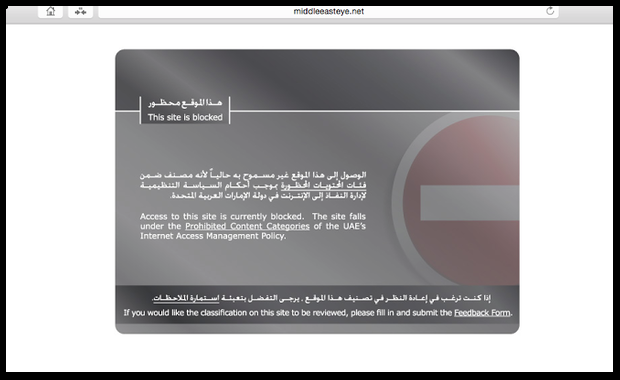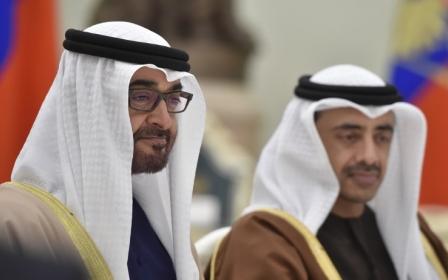UAE government blocks access to Middle East Eye

The United Arab Emirates has blocked access to the Middle East Eye website, according to UAE residents who have shared screenshots of the blocked site after they tried to access it.
The residents said on Wednesday morning that the site was no longer able to be viewed in the Gulf state.
Anyone who attempts to access the website in the UAE now receives this official message: “Access to this site is currently blocked. The site falls under the Prohibited Content Categories of the UAE’s Internet Access Management Policy.”
It is not clear when Emirati authorities blocked MEE.
MEE has not been notified of the reason for the block, and the UAE’s London Embassy did not answer calls on Wednesday morning.
Emirati human rights activist Ahmed Mansoor said that he was unsurprised MEE has been blocked by UAE authorities.
"It was only a matter of time before they blocked the [Middle East Eye] website," he said. "They can't handle truth about their reality, so they solve their problems by blocking them."
MEE has reported extensively on the UAE, including revealing the Gulf State’s covert relations with Israel, its political and military role across the region, as well as covering its alleged human rights abuses.
The OpenNet Intiative, which monitors internet filtering, has reported that the UAE "censors political and religious content and pervasively filters websites that contain pornography or content relating to alcohol and drug use, gay and lesbian issues, dating or gambling".
Access to the internet in the UAE is regulated by the Telecommunications Regulatory Authority (TRA). The TRA sets out the rules for deciding whether a website should be permitted for viewing in the UAE.
The vast majority of online content blocked by the UAE is, according to the TRA, websites that "contradicts with the ethics and morals of the UAE". So far in 2016 the TRA reported that 81 percent of blocked content is in this category.
Nine percent of blocked websites are ones that the TRA says are "not in line with UAE laws" and six percent are "internet content that directly or indirectly constitutes a risk on UAE internet users such as phishing websites, hacking tools, and spy wares".
Some internet users install Virtual Private Network (VPN) connections as a way of bypassing local restrictions on web use.
However, the use of VPNs in the UAE is prohibited by the TRA and can lead to arrest. In 2015 Emirati authorities were reported to have established “electronic surveillance” committees to ensure internet cafes are not using VPNs to access banned content.
This article is available in French on Middle East Eye French edition.
New MEE newsletter: Jerusalem Dispatch
Sign up to get the latest insights and analysis on Israel-Palestine, alongside Turkey Unpacked and other MEE newsletters
Middle East Eye delivers independent and unrivalled coverage and analysis of the Middle East, North Africa and beyond. To learn more about republishing this content and the associated fees, please fill out this form. More about MEE can be found here.




